Unlock the Benefits of Lavender Essential Oil Uses
🕑5 min read
Have you ever wondered why lavender essential oil is so popular and versatile? This incredible oil has been used for centuries for its myriad benefits, from stress relief to skincare solutions.
In this blog post, we will explore the history, benefits, and various lavender essential oil uses, and even share some DIY recipes and ideas to incorporate this wonderful oil into your daily routine.
Short Summary
Lavender essential oil has a wide range of uses and benefits, ranging from calming scents to antimicrobial properties.
Blending lavender oil with complementary essential oils can create unique fragrances and amplify its therapeutic effects.
Proper dilution, application methods, and precautions should be taken when using lavender essential oil for DIY skincare products or insect repellent purposes.
Unlocking the Power of Lavender Essential Oil
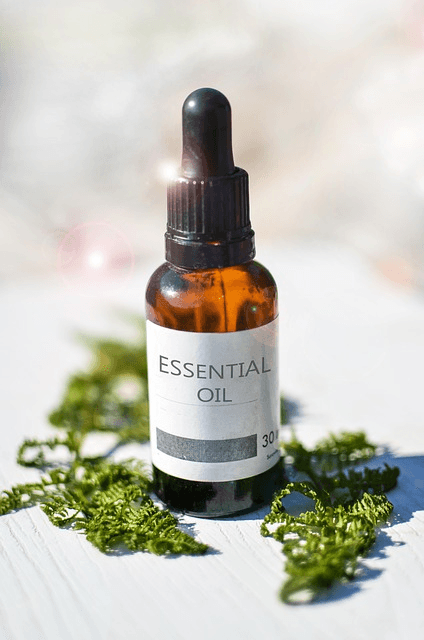
Native to the Mediterranean, the Arabian Peninsula, and Russia, lavender oil has been used for at least 2,500 years. Its powerful properties have made it a staple in many complementary therapies and alternative medicine, providing an array of health benefits that contribute to overall well-being.
Lavender essential oil, derived from the Lavandula angustifolia plant, is widely known for its calming scent, which has been shown to improve sleep, reduce stress, and support the nervous system. Lavender oil is also popular for its antimicrobial properties, making it effective against bacterial and fungal infections.
Its anti-inflammatory properties can help soothe irritated skin, reduce redness, and even alleviate pain associated with menstrual cramps when applied topically. With its wide range of uses and benefits, it's no wonder lavender oil is considered a must-have oil in many households.
A Brief History of Lavender Oil
Lavender oil's rich history dates back to ancient civilizations. The Egyptians used it in the mummification process and as a perfume, while the Romans used it for scenting baths, laundry, and even for medicinal purposes. The word "lavender" itself comes from the Latin word 'lavare,' which means 'to wash'.
This unmistakable aroma has been cherished for centuries and continues to be a popular choice for relaxation and stress relief today.
Why Lavender Oil is So Popular
One of the reasons for the popularity of lavender oil is its versatile properties and mild nature when applied directly to the skin. It is rich in antioxidants, which help protect the skin from free radicals and promote a healthy complexion. Additionally, lavender oil can be diluted in a carrier oil like coconut oil and applied to the skin after cleansing the face, or even used as a facial toner by combining a few drops of lavender plant with witch hazel.
Lavender oil's natural insect-repelling properties make it an excellent choice for outdoor enthusiasts looking to avoid pesky bugs. Furthermore, its soothing scent is often used in aromatherapy to promote relaxation and combat insomnia. With so many benefits and uses, it's no surprise that lavender oil remains one of the most popular essential oils in the world.
Top Uses for Lavender Essential Oil
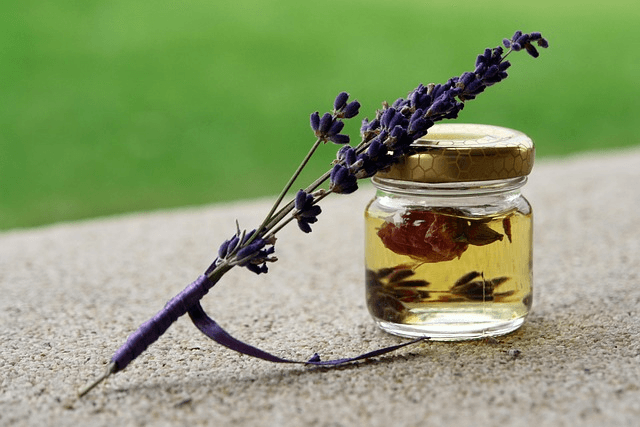
From stress relief to skincare, lavender oil's diverse applications make it an invaluable addition to any essential oil collection.
In the following sections, we will explore specific ways to incorporate lavender essential oil into your daily life and enhance its benefits by blending it with other essential oils.
Stress Relief and Relaxation
Lavender oil's calming properties have been well documented in scientific research. In a study published in Physiology & Behavior, inhaling the scent of lavender was associated with decreased anxiety and improved mood. Another such study published also found that taking 80-milligram capsules of lavender essential oil could alleviate anxiety, sleep disturbance, and depression. These findings suggest that lavender oil may be a valuable natural remedy for stress relief and relaxation.
There are various ways to harness the stress-relieving benefits of lavender oil. Diffusing it in your home or office can create a calming environment, while inhaling the scent directly from the bottle can provide a quick and portable solution for on-the-go stress relief. For targeted relief, combine a few drops of lavender oil with a carrier oil like jojoba or sweet almond oil, and massage it into the temples and back of the neck to help alleviate tension headaches or migraines.
To create a relaxing atmosphere before bedtime, try adding a few drops of lavender oil to a warm bath or using a lavender-infused pillow spray to promote a restful night's sleep. These simple yet effective methods can help you incorporate the stress-relieving benefits of lavender oil into your daily routine.
Skincare Solutions
Lavender oil's anti-inflammatory properties make it an excellent choice for skincare, helping to alleviate skin irritation, reduce redness, and promote a healthy complexion. For instance, it can be used to soothe eczema and psoriasis by combining three to four drops with a carrier oil like coconut or jojoba oil and massaging the mixture into the affected area. Additionally, lavender oil can be added to face or body wash for an aromatic and soothing shower experience.
Beyond addressing occasional skin irritations, lavender oil can also be used for overall skin health. Its antioxidant properties help protect the skin from free radicals and environmental stressors, while its antimicrobial properties can aid in combating acne and other skin imperfections. To incorporate lavender oil into your skincare routine, consider adding a few drops to your favorite moisturizer, or create a DIY face mask with ingredients like honey, yogurt, or clay.
Haircare can also benefit from the addition of lavender oil. A few drops massaged into the scalp can help alleviate dandruff and promote a healthy scalp environment. Furthermore, research suggests that lavender oil may be effective in reversing hair loss, particularly in cases of alopecia areata. By incorporating lavender oil into your daily skincare and haircare routine, you can enjoy its myriad benefits for a healthy and vibrant appearance.
Sleep Aid
Lavender oil has long been recognized for its ability to promote restful sleep and combat insomnia. A 2018 study revealed that college students who combined sleep hygiene techniques with lavender essential oil therapy got better and undisturbed sleep than those who relied on sleep hygiene alone. The findings suggest that the combination of these two therapies can significantly fight insomnia and improve the quality of sleep. The students who inhaled lavender at bedtime also reported improved daytime energy and vibrancy.
Incorporating lavender oil into your sleep routine can be as simple as diffusing it in your bedroom prior to or during sleep, applying it directly to your neck, chest, and temples, or adding a few drops to a warm bath with Epsom salt. A blend of lavender oil, Roman chamomile, and magnesium oil is even more effective for improving sleep quality.
With its calming properties and ability to improve sleep, lavender oil is an invaluable addition to your nightly routine.
Blending Lavender Oil with Other Essential Oils
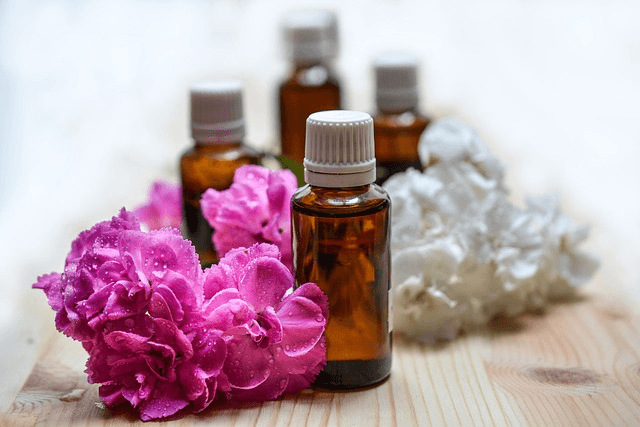
In addition to its many standalone benefits, lavender oil can be blended with other essential oils to create unique scents and amplify its therapeutic properties.
In the following sections, we will explore popular essential oils that pair well with lavender oil and discuss how combining them can enhance their primary benefits.
Complementary Scents
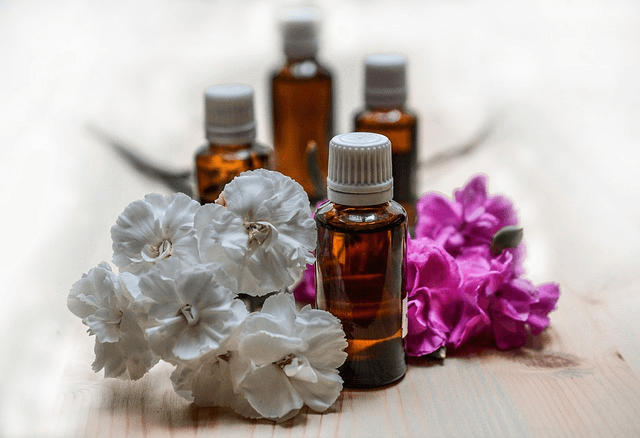
Lavender oil pairs well with a variety of essential oils, such as rose, rosemary, peppermint, chamomile, cedarwood, grapefruit, tea tree, jasmine, ylang ylang, ginger, and lemon. These complementary scents create pleasant and calming aromas when blended with lavender, making them ideal for use in aromatherapy or as natural perfumes.
Experimenting with different combinations can lead to delightful and personalized scents that cater to your preferences.
Boosted Benefits
Combining lavender oil with specific essential oils can enhance their therapeutic properties. For example, blending lavender oil with frankincense can help reduce inflammation and minimize the appearance of aging, such as dark spots, when applied topically.
Thyme, rosemary, and cedarwood oils in combination with lavender oil can be beneficial for managing alopecia areata and hair loss. Massaging the above essential oils into the scalp on a daily basis is known to promote good hair health and growth. Keep in mind that when blending lavender oil with other essential oils, it is essential to utilize a carrier oil to dilute the essential oils and prevent skin irritation.
Experimenting with different blends can lead to unique and personalized essential oil combinations that provide enhanced benefits for relaxation, skincare, and overall well-being.
Tips for Using Lavender Essential Oil Safely
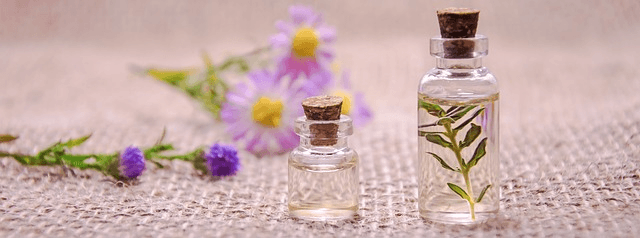
To maximize the benefits of lavender essential oil while ensuring its safe use, it is important to take some precautions. In the following sections, we will discuss proper dilution, application methods, and potential risks associated with lavender essential oil to help you enjoy its numerous benefits in a safe and responsible manner.
Diluting with Carrier Oils
Diluting lavender essential oil with a carrier oil, such as coconut, argan, or olive oil, is crucial before topical application. This not only prevents skin irritation, but also helps the oil to be absorbed more effectively by the skin. A general guideline for dilution is to mix a few drops of lavender oil with a carrier oil of your choice before applying it to the desired area.
When using lavender oil for aromatherapy, it is typically not necessary to dilute it with a carrier oil, as the oil is being diffused into the air and not applied directly to the skin. However, if you plan to use lavender oil topically, always ensure that it is properly diluted to prevent skin sensitivity or irritation.
Application Methods
There are various ways to apply lavender essential oil, depending on your desired outcomes and preferences. For topical application, combine a few drops of lavender oil with a carrier oil and massage it into the affected area. To enjoy the soothing scent of lavender, diffuse it in your home or office, or inhale it directly from the bottle for on-the-go stress relief. You can also create a compress by adding a few drops of lavender oil to a wet cloth and applying it to the desired area.
For skincare, consider adding a few drops of lavender oil to your favorite moisturizer, or create a DIY face mask with ingredients like honey, yogurt, or clay. To incorporate lavender oil into your hair care routine, massage a few drops into your scalp to alleviate dandruff and promote a healthy scalp environment.
It is essential to remember that when using lavender oil, always conduct a patch test on a small area of skin to ensure you do not have an allergic reaction or sensitivity to the oil. Additionally, consult with a medical professional before using lavender oil if you are pregnant, nursing, or under the care of a doctor.
Precautions and Potential Risks
Although lavender essential oil is generally considered safe, some individuals may experience skin irritation or an allergic reaction when using it. To minimize the risk of adverse effects, always dilute the oil with a carrier oil before applying it to the skin and conduct a patch test on a small area of skin before applying it to a larger area.
Keep in mind that lavender oil should not be ingested without the guidance of a qualified health care professional, as more research is needed to determine its safety and effectiveness for internal use.
Pregnant women and those who are breastfeeding should also exercise caution when using lavender oil, and consult with a medical professional before using it.
DIY Lavender Oil Recipes and Ideas
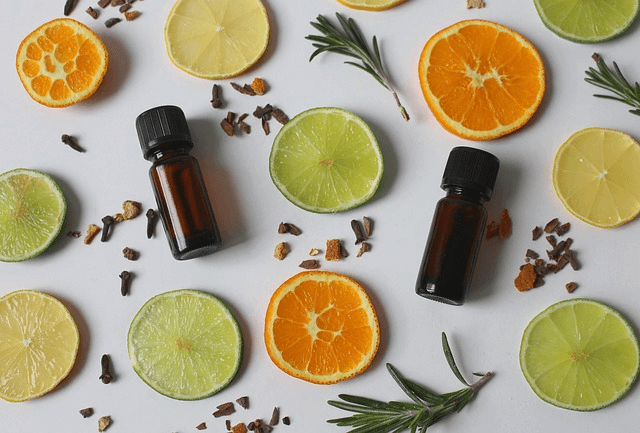
Now that you have a better understanding of lavender essential oil's benefits and uses, why not try incorporating it into some homemade products?
In the following sections, we'll provide simple recipes and ideas for using lavender essential oil in your daily routine, from pillow sprays to skincare products.
Lavender Pillow Spray
A lavender pillow spray is a simple yet effective way to promote peaceful sleep and create a relaxing atmosphere in your bedroom. To create your own lavender pillow spray, combine 20-30 drops of lavender essential oil with 1 oz of distilled water in a spray bottle. Shake the bottle thoroughly before use, and spray the mixture onto your pillow and linens before bedtime.
This soothing lavender pillow spray can also be used to freshen up your linen closet or as a gentle room spray, filling your home with the unmistakable aroma of lavender. When stored away from direct sunlight, the spray can remain effective for up to 6 months to a year.
Homemade Skincare Products
Incorporating lavender oil into homemade skincare products can provide a calming scent and therapeutic benefits. For example, try adding a few drops of lavender oil to a homemade face mask made with ingredients like honey, yogurt, or clay. You can also add a few drops to your favorite moisturizer or create a DIY body lotion by combining lavender oil with a carrier oil like coconut or jojoba oil.
Another idea is to create a soothing bath soak by adding a few drops of lavender oil to Epsom salts or bath bombs. This can help to relax both your body and mind while promoting a restful night's sleep. Experiment with different recipes and ideas to find the perfect way to incorporate lavender oil into your skincare routine.
Insect Repellent
Lavender essential oil is a natural insect repellent, making it an excellent choice for outdoor enthusiasts looking to avoid pesky bugs. To create a lavender insect repellent, combine lavender essential oil with distilled water or apple cider vinegar in a spray bottle. Shake the bottle to mix the ingredients, and apply the spray to your body and clothing before going outside.
In addition to repelling insects, lavender oil can also help soothe occasional skin irritations caused by insect bites. Simply mix a few drops of lavender oil with a carrier oil and apply it to the affected area to reduce inflammation and promote healing.
With its natural insect repelling properties and soothing effects, lavender oil is an invaluable addition to your outdoor adventures.
Summary
In conclusion, lavender essential oil is a versatile and powerful natural remedy with a myriad of benefits and uses. From stress relief and relaxation to skincare solutions and insect repellent, this popular essential oil has something to offer everyone. By incorporating lavender oil into your daily routine, blending it with other essential oils, and creating DIY recipes, you can harness its myriad benefits and improve your overall well-being. So why not give lavender essential oil a try and experience its calming and soothing effects for yourself?
Frequently Asked Questions
Can I apply lavender oil directly to skin?
Yes, you can apply lavender oil directly to your skin. It is safe to do so and may even have additional benefits when mixed with other ingredients.
Make sure to use a clean cotton ball or your fingers when applying.
How do you use lavender oil in a bed?
For best results, you can use lavender oil in the bedroom before bedtime by either placing a few drops on your pillow, using a diffuser, or adding two drops of it to a relaxing bath.
This will help create a calming environment and support a better night's sleep.
What is lavender essential oil good for?
Lavender essential oil has a variety of therapeutic benefits that make it a popular choice among those looking for natural healing. Its calming, anti-inflammatory and antinociceptive properties make it an ideal choice for treating stress, anxiety, fungal infections, allergies, depression, insomnia, eczema, nausea, and menstrual cramps.
Can I apply lavender oil directly to skin?
Yes, you can apply lavender oil directly to skin. When using essential oils, it is often recommended to dilute the oil in a carrier substance for safety and greater absorption.
Using lavender oil with other ingredients can also provide additional benefits.